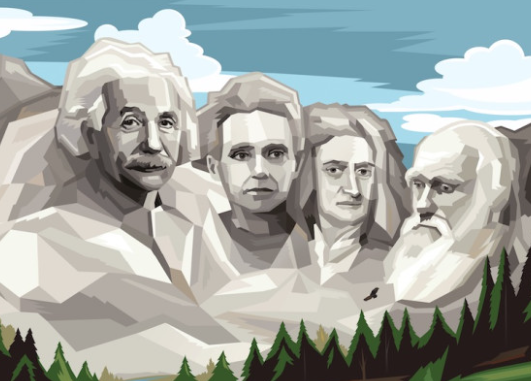
Introduction
Throughout history, brilliant minds have pushed the boundaries of human knowledge, revolutionizing our understanding of the world and shaping the course of progress. These scientists have made groundbreaking discoveries, invented game-changing technologies, and left a lasting impact on society. In this article, we will explore the remarkable contributions of some of the world’s most famous scientists and their enduring legacies.
1. Sir Isaac Newton (1643-1727)
Contributions:
- Laws of Motion: Newton’s three laws of motion laid the foundation for classical mechanics, explaining the relationship between the motion of objects and the forces acting upon them.
- Law of Universal Gravitation: His law of gravitation described the force of attraction between all objects with mass, explaining the orbits of planets and celestial bodies.
- Calculus: Newton independently developed calculus, a fundamental branch of mathematics used in physics, engineering, and many other fields.
Legacy: Newton’s work has had a profound and lasting impact on science, mathematics, and engineering, providing the basis for understanding the physical world.
2. Marie Curie (1867-1934)
Contributions:
- Radioactivity: Curie’s pioneering research on radioactivity led to the discovery of radium and polonium. She also developed methods for the measurement of radioactivity.
- Two Nobel Prizes: She became the first woman to win a Nobel Prize and the only person to win Nobel Prizes in two different scientific fields (Physics and Chemistry).
Legacy: Marie Curie’s work laid the groundwork for modern nuclear physics and led to advancements in medical treatments, including radiation therapy for cancer.
3. Albert Einstein (1879-1955)
Contributions:
- Theory of Relativity: Einstein’s theories of special and general relativity transformed our understanding of space, time, and gravity. His equation, E=mc^2, revolutionized physics by linking mass and energy.
- Quantum Mechanics: While not a quantum physicist, his contributions to the field were significant, including his explanation of the photoelectric effect.
Legacy: Einstein’s work reshaped the field of theoretical physics, and his theories continue to influence scientific thought and technological advancements.
4. Charles Darwin (1809-1882)
Contributions:
- Theory of Evolution: Darwin’s groundbreaking theory of natural selection explained the mechanism of evolution and how species change over time.
- On the Origin of Species: His book laid out the evidence for evolution by natural selection and its implications for biology.
Legacy: Darwin’s theory of evolution by natural selection remains one of the most influential ideas in the history of science, shaping our understanding of biology and the diversity of life on Earth.
5. Rosalind Franklin (1920-1958)
Contributions:
- DNA Structure: Franklin’s X-ray crystallography research was instrumental in uncovering the double helix structure of DNA, although her contributions were not fully recognized during her lifetime.
Legacy: Franklin’s work provided critical insights into the structure of DNA, contributing to our understanding of genetics and molecular biology.
6. Thomas Edison (1847-1931)
Contributions:
- Electric Light Bulb: Edison is credited with inventing the practical incandescent light bulb, making electric lighting accessible to the masses.
- Phonograph: He developed the phonograph, an early sound recording device.
- Electric Power Distribution: Edison pioneered the development of the electrical power industry, including the creation of the first electrical power grid.
Legacy: Edison’s innovations in electrical engineering and sound recording transformed daily life and laid the groundwork for modern electric power distribution systems.
7. Nikola Tesla (1856-1943)
Contributions:
- Alternating Current (AC): Tesla’s work on alternating current power systems enabled the widespread distribution of electricity over long distances.
- Wireless Communication: He made significant contributions to radio and wireless technology, laying the foundation for future telecommunications.
Legacy: Tesla’s inventions have had a lasting impact on the modern world, particularly in the fields of electricity generation and wireless communication.
8. Stephen Hawking (1942-2018)
Contributions:
- Hawking Radiation: His theoretical work on black holes, including the concept of Hawking radiation, advanced our understanding of these enigmatic cosmic objects.
- Theoretical Physics: Hawking made significant contributions to theoretical physics, cosmology, and the study of the universe’s origins.
Legacy: Stephen Hawking’s research expanded our knowledge of the universe, black holes, and the nature of space and time, making complex scientific concepts accessible to a broad audience.
9. Jane Goodall (1934-Present)
Contributions:
- Primatology: Goodall’s pioneering research on wild chimpanzees in Tanzania revolutionized our understanding of primate behavior, tool use, and social structures.
- Conservation: She has been a passionate advocate for wildlife conservation and the protection of endangered species.
Legacy: Jane Goodall’s work has reshaped our understanding of animal behavior and the importance of conservation, inspiring generations to protect our natural world.
10. Alan Turing (1912-1954)
Contributions:
- Turing Machines: Turing’s theoretical work on computing machines laid the foundation for modern computer science and the concept of algorithms.
- Codebreaking: During World War II, Turing played a vital role in breaking the Enigma code used by Nazi Germany, significantly contributing to the Allied victory.
Legacy: Alan Turing’s contributions to computer science and cryptography have had a profound and enduring impact on technology, computing, and security.
Conclusion
These famous scientists have left an indelible mark on science, technology, and our understanding of the world. Their contributions have paved the way for countless advancements and continue to shape our lives today, demonstrating the power of human curiosity, innovation, and the pursuit of knowledge.